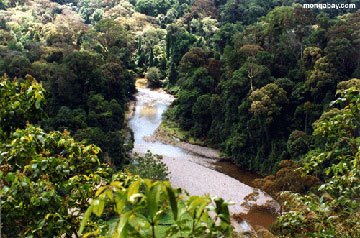The hidden value of Bali: Why saving the world’s rainforests is good for the climate and the US economy
The hidden value of Bali: Why saving the world’s rainforests is good for the climate and the US economy
Jeff Horowitz and Robert O’Sullivan,
Avoided Deforestation Partners
January 10, 2008
A few weeks ago, over 10,000 politicians, scientists, NGO representatives, and academics inundated Bali, Indonesia. The goal was to negotiate, lobby, and struggle through the increasingly complex web of international climate change policy. At the end of it all an agreement was reached as part of the “Bali Action Plan” to spend two more years negotiating on a future agreement that should include reducing deforestation in developing countries—something that currently accounts for up to 25% of global greenhouse gas emissions.
Many people think these talks are too technical or too soft on action. A closer look at the Bali decisions shows that this round of negotiations are significant for future US engagement in international climate policy and millions of hectares of tropical forests, Surprisingly, this in turn becomes significant for US companies.
The US did not ratify the last treaty to address climate change—the 1997 Kyoto Protocol. The Clinton administration agreed to the text of the agreement in 1997 but the Bush administration pulled out before it became binding in the US arguing that developing countries were not required to do enough to reduce their own emissions under the agreement, which meant this would hurt the US economy.
 Rainforest in Malaysian Borneo. Photo by Rhett A. Butler |
Despite the bashing it receives in some quarters in the US the Kyoto Protocol was ratified by over 175 countries and is regarded as one of the most revolutionary and successful pieces of international environmental law ever. The treaty has created a multi-billion dollar market for trading emission-reduction credits and helped trigger billions of dollars of underlying investment into renewable energy and other projects in developing countries that reduce greenhouse gas emissions.
The Kyoto Protocol did not, however, address the critically important issue of deforestation in developing countries. The greenhouse gas emissions released due to rampant deforestation account for up to 25 percent of global emissions. This makes deforestation a bigger source of carbon emissions than the entire world’s transportation sector. If these emissions are not reduced, they will wipe out any climate benefits achieved by other noble deeds. For example, buying renewable power, driving a Prius, or turning down the thermostat this winter are valuable actions but pale in comparison to the enormous benefits of curbing deforestation.
Stopping deforestation is about more than just the climate. Every year, an area the size of Alabama is deforested to accommodate demand for lumber and the need for a variety of alternative land uses, from soy plantations to pastureland for cattle. Fragile areas of huge biodiversity that have taken centuries to evolve are being permanently decimated at an alarming rate. This causes multiple layers of harm, from the disruption of weather patterns to lost opportunities to find new medicines. Indigenous peoples are losing their homes and livelihoods. At current rates of deforestation, Indonesia’s entire orangutan population will be gone in 20 years.
 Rainforest in western Uganda. Photo by Rhett A. Butler |
The agreement on deforestation incorporated into the Bali Action Plan is remarkable as it offers hope that something will be done to stop this destruction. Equally important, the Bali outcomes contain a possible way forward to addressing concerns the US had with the Kyoto agreement.
First, a number of developing countries have stated in the Bali decisions that they may be willing to take action to reduce deforestation. Second, reducing emissions from deforestation is the most cost-effective way to reduce emissions globally. New technologies are not needed and deforestation can be reduced now.
One of the favored sources of finding the $10 billion or more per year it is estimated is required to significantly reduce deforestation is to expand the booming emissions trading market created by the Kyoto Protocol. If this increased supply is met by increased demand this expansion is good. Including deforestation in the emissions-trading market will reduce the overall costs of cutting emissions globally, making it a win-win situation for the economy and the world’s forests.
Many US companies are already faced with state-based legislation to reduce their emissions, with expectations that more federal legislation will come. Most reductions need to happen domestically, and many cost-effective options are available. However, if US companies are able to partially use the international carbon market, they will be able to meet overall reduction targets more cost effectively. This will help reduce the overall costs to the US economy that many fear—correctly or not—may be incurred if the US embraces emission caps.
The Bali Action Plan is significant as it opens the window to engage the US and US companies to become part of the global response to avert a climate catastrophe, and save the world’s rainforests before they disappear forever.
Jeff Horowitz and Robert O’Sullivan are founding partners of Avoided Deforestation Partners (www.adpartners.org) an independent network and think tank on deforestation policy. Robert is also the Executive Director, North America for the consulting firm Climate Focus. AD Partners were intimately involved in the recent international treaty policy negotiations in Bali regarding the inclusion of provisions to use carbon trading to save tropical forests.
Related articles
Could carbon credits-for-forest conservation (REDD) reduce terrorism and global warming?
(12/20/2007) Schemes to offer carbon credits for reducing deforestation rates in developing countries could improve American security by providing stable income to disaffected rural groups, argues a new Council on Foreign Relations report on the impact of climate change on U.S. national security.
Bali delegates agree to support forests-for-climate (REDD) plan
(12/16/2007) Delegates meeting at the U.N. climate conference in Bali agreed to include forest conservation in future discussions on a new global warming treaty, reports the Associated Press. The move could lead to the transfer of billions of dollars — in the form of carbon credits — from industrialized countries to tropical nations for the purpose of slowing greenhouse gas emissions by reducing deforestation rates. Deforestation presently accounts for roughly 20 percent of anthropogenic emissions worldwide.
Communities must benefit for forest carbon schemes to be effective
(12/13/2007) Much has been promised by what avoided deforestation carbon credits can do to support forest protection, increase tax revenues, and develop sustainable rural economies in our Zamrud Khatulistiwa or Emerald on the Equator.
REDD will fail if needs of forest communities aren’t addressed
(12/7/2007) Initiatives to reduce emissions by reducing tropical deforestation (REDD) will fail unless policymakers adequately address the underlying drivers of forest degradation and destruction, argues a new report published by the Center for International Forestry Research (CIFOR).
Amazon deforestation could be eliminated with carbon priced at $3
(12/4/2007) The Amazon rainforest could play a major part in reducing greenhouse gas emissions that result from deforestation, reports a new study published by scientists at the Woods Hole Research Center, the Instituto de Pesquisa Ambiental da Amazônia, and the Universidade Federal de Minas Gerais. At a carbon price of $3 per ton, protecting the Amazon for its carbon value could outweigh the opportunity costs of forgoing logging, cattle ranching, and soy expansion in the region. 2008 certified emission-reduction credits for carbon currently trade at more than $90 per ton ($25 per ton of CO2).
Could the carbon market save the Amazon rainforest?
(11/29/2007) The global carbon market could play a key role in saving the Amazon from the effects of climate change and economic development, which could otherwise trigger dramatic ecological changes, reports a new paper published in Science. The authors argue that a well-articulated plan, financed by carbon markets, could prevent the worst outcomes for the Amazon forest while generating economic benefits for the region’s inhabitants.
Carbon credits for forest conservation concept faces challenges
(11/27/2007) While environmentalists, scientists, development exports, and policymakers across the political spectrum are ethusiastic about the idea of offsetting carbon emissions by preventing deforestation (a concept known as “avoided deforestation” or Reduced Emissions from Deforestation and Degradation (REDD)), the concept still faces many challenges, especially in implementation.
Rainforest countries form pact to push global warming solutions
(9/13/2007) Eight tropical countries containing 80 percent of the world’s remaining tropical forest cover have formed an alliance to have forest conservation included in a post-Kyoto agreement on climate change, reports the Financial Times. The “Forestry Eight”, as the group is called, includes Brazil, Malaysia, Papua New Guinea, Gabon, Cameroon, Costa Rica, Congo and Indonesia.
Indonesia’s peatlands may offer U.S. firms global warming offsets
(8/29/2007) The following is modified version of a letter I’ve used to pitch U.S. companies on the concept of carbon finance in Indonesia’s peatlands. Discussions are slow and the critical December U.N. climate meeting is fast approaching, so I’m posting this as a tool to help you get American firms interested in avoided deforestation offsets. Please feel free to use, modify, and distribute this letter widely.
How private equity can profit from carbon offsets in Indonesia
(8/29/2007) The emerging carbon market for avoided deforestation presents unprecedented opportunities for private equity to make profitable investments that also help protect the environment. Indeed, for the first time, conservation may be associated with positive financial returns. Here’s a brief look at how private equity and other investors can capitalize on this opportunity to earn attractive returns while fighting climate change, protecting ecosystem services, and safeguarding endangered species like orangutans.







